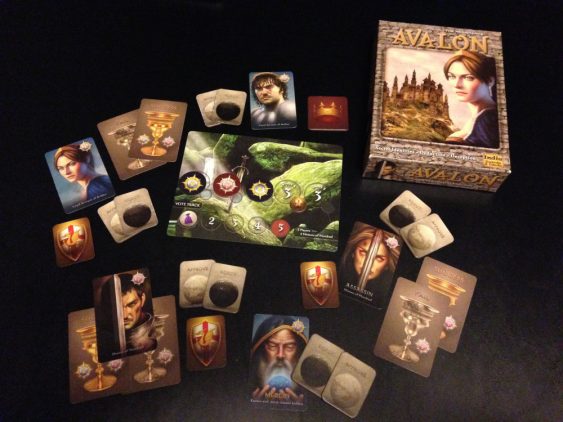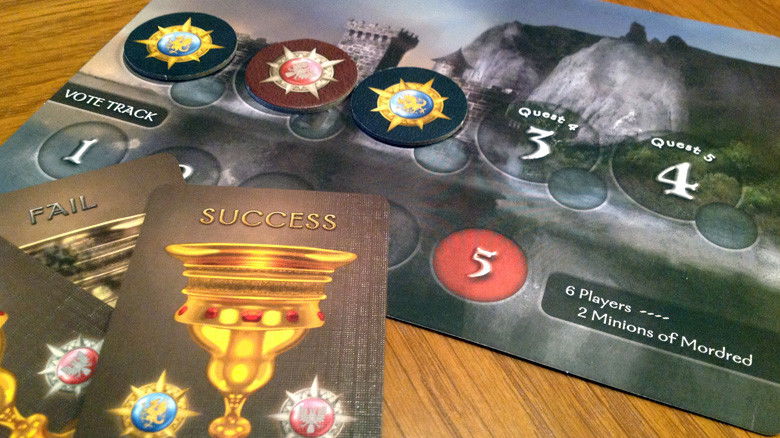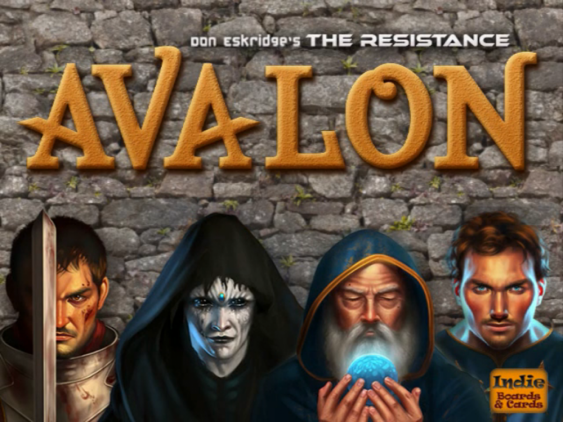In this medieval-themed, social deduction game, players take on the secretive roles of clueless heroes and hidden spies in Don Eskridge’s The Resistance: Avalon. The heroes represent the forces of Good aligned with King Arthur, yet hidden among them are devious minions of the Evil Mordred. The Resistance: Avalon is a game of hidden loyalty, deception, and logical deduction.
Title: The Resistance: Avalon
Players: 5-10, recommend 7
Type: Social Deduction, Bluffing, Party
Time: 30 minutes
Designer: Don Eskridge
Publisher: Indie Board Games & Cards
Release Date: 2012
Expansions: This is a stand-alone expansion of The Resistance.
Overview
Avalon is reminiscent of games like Mafia and Werewolf, where a few, secret players attempt to disrupt a larger, uninformed group at the same time as the group is trying to identify and eliminate the secret players. Avalon employs several mechanics that encourage more dialogue and bluffing among players, making this game an enjoyable, portable party game for 5-10 aspiring knights.

What’s in the Box?
In a compact 8×6 box, Avalon contains 14 character cards, including unique roles such as Merlin, Assassin, Percival, Mordred, Morgana, and Oberon, and generic characters, the Loyal Servants of Arthur and the Minions of Mordred. There is a small board that keeps track of quest completion/failure, voting cards, and lots of small cardboard pieces. The sheer number of pieces to hold, keep track of, or keep hidden in your hands makes it difficult to play this game in your lap or just using your hands.
The art is reminiscent of Edmund Leighton’s medieval-themed paintings and relies on simple color contrasts (red vs. blue, gold vs. black) to mark Good and Evil, Success and Failure, and so forth. While the art may not be very remarkable compared to similarly-themed games, it passes an important design test – to communicate information quickly and to make it simple for players to make decisions.
How Does It Play?
Before the game begins, players are roughly split in half into Good and Evil teams. Special and generic characters are shuffled into a deck and drawn at random.
Merlin is usually a required character, a Good Player who is told at the beginning of the game who the Evil players are. He cannot, however, reveal his identity openly. Another required character is the Assassin, who at the end of the game may be given a chance to guess Merlin’s identity and win the game for Evil.
After players have looked at their cards in secret, someone will read a script that allows the minions of Mordred to identify each other. This allows them to know who to work with to win the game. After this phase, players are never allowed to reveal their characters, but they can discuss, guess, or even accuse each other of what their role might possibly be.
In my playthrough of 7 players, we started with Merlin, Mordred, and the Assassin. This felt fairly optimal, but after a few rounds, it became almost necessary to change the combination to keep gameplay fresh.
Playing with Percival (who protects Merlin), Morgana (who masquerades as Merlin), and Oberon (who does not reveal himself to Merlin) introduce more layers of deception, which leads to some light role-play and bluffing. Different combinations of characters will make the game harder to win for one side or the other, which can makes victory seem hard-earned.
Putting characters aside for a moment, there are three main elements to Avalon’s gameplay: secret identities and abilities, public voting, and completion/failure of quests.

A round of play consists of a team-building phase and a quest phase. The chosen leader of the round proposes a Quest. Using what they already know, the leader will choose the number of players to bring on the Quest. The group will vote to approve/disapprove of the team. If approved, the team will proceed with the Quest. If rejected, the next player will suggest a team. If teams are rejected too many times, Evil will win.
If the team is approved, they will go the Quest. Unfortunately, this is where Avalon lacks narrative punch. There are no descriptions about what these quests – the only thing that matters is if the team will succeed or fail. Each player will cast their vote, and if even a single Fail card is played, the Quest fails. In either case, a token will be added to the quest track to mark progress.
For Good players, the goal to complete three Quests successfully. Evil can prevail in a couple of different ways – to make three Quests end in failure or assassinate Merlin by game’s end.
How was the Experience?
One of the things that makes Avalon different from a game like Mafia is avoiding player elimination. If players are eliminated early, they have to sit out for most of the game. In Avalon, rounds come quickly and everyone participates in the voting system for teams and Quests. By purposely failing missions or picking certain people to participate in Quests, players can make informed guesses about the others’ characters.
As for myself, I tried a different approach – staying mostly silent throughout some rounds allowed me to hide my Evil identity. However, I wouldn’t recommend adopting this tactic for the entire game if you want to maximize your experience.
Most of the fun actually comes from messing around with the other players or engaging in light role-play – who knows if someone will make a slip! I find that if too many people are playing quietly, the team-building and Quest phases can feel a little robotic. This is where a moderator still plays an important role in keeping up the energy and momentum of the game if it starts to drag.
Summary
Conclusion
Based on its quick gameplay and easy-to-understand rules, Avalon is a great entry into social deduction and hidden loyalty board games. It won’t create a deep role-playing experience, but for the right group, messing around with clueless players is where this game really shines.
Pros
- Compact box for easy travel
- Great for groups 5-10
- Every player participates
- Quick play time of 30 minutes
Cons
- Somewhat lacking in story-telling, especially with Quests
- You almost always have to play on a flat surface – lots of tokens to keep track of
- Repetitive if you always play with the same combination of special characters
- Not for a quiet group of players
If you liked this game, you might try Avalon’s sci-fi predecessor The Resistance. Both games are standalone, but interestingly, they can be combined and played together.
-
Overall Rating


